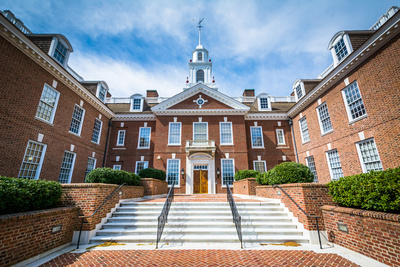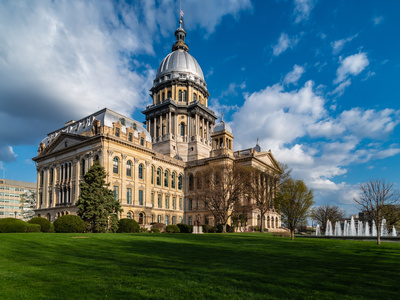May was a busy month as several state legislatures struggled to finish budgets before the end of their sessions. Crafting a budget is a notoriously difficult process in which lawmakers weigh competing interests that jockey for scarce funds, the possible need for new revenue streams, and constitutional requirements for a balanced fiscal plan. It can also be a halting process, with plans springing up suddenly only to be discarded days or even hours later.
All of this can make the process difficult to follow, so we've summarized the action in the states that have had the most trouble getting their state budgets out the door. There were too many states with contentious budgets to include in just one article, so check back tomorrow for part two.
In this first edition: Illinois, Louisiana, Minnesota, and New Mexico.
Illinois' budget impasse slogs on for another year
Illinois has been at a budget impasse since 2015 as Governor Rauner (R) and Speaker Madigan (D) have failed to find a compromise on the state's fiscal direction. In the face of this logjam, the senate attempted to forge a bipartisan “grand bargain” (
IL SB 9) that would cut through the bickering and result in a revenue package all factions could live with. Lawmakers took great pains to find a set of policies that could pass muster, which included the possibility of adding a new payroll tax, expanding the sales tax base, and eliminating a host of tax credits and exemptions. With
time running out, the senate abandoned its drive for bipartisanship and passed SB 9 on May 23.
Outside the senate, however,
the bill has no friends. The governor opposed it for not including his budget priorities (property tax relief and workers' compensation reform), the Republican caucus opposed it as a “punishing tax increase,” and the speaker gave it only a tepid reception, saying it would be “thoughtfully considered.” And now that May 31 has come and gone, these long odds have only gotten longer because revenue bills now must secure a three-fifths vote, all but ensuring that the budget impasse will continue for the foreseeable future.
Louisiana lawmakers struggle to find revenue to fill their budget gap
Louisiana's history of structural budget problems and vitriolic tax debates returned in full force this year as lawmakers have struggled to cobble together a plan to close a potential
$1 billion budget shortfall. Governor Edwards (D) came out swinging early in the session, calling to expand the sales tax base and impose a new gross receipts tax, but those efforts died in a
torrent of political opposition.
Other efforts to raise new revenue (notably including a permanent extension of last year's “
clean penny” sales tax expansion) have also been met with defeat, leaving lawmakers at a loss on where to find the money to meet the state's balanced budget requirement.
The spending side of the debate has been
no less heated as factions have moved to block the passage of any funding bills. A central conflict comes from a house proposal to hold back $206 million worth of government funds to create a buffer against any future revenue downgrades — a plan that the senate opposes.
Governor Edwards says he
plans to call a special session to start 30 minutes after the regular session ends on June 8, though, interestingly, taxes are not currently within the parameters of the session.
Minnesota's budget surplus leads to a showdown between the governor and state GOP
Minnesota's budget problems this year stemmed from the fact that the state was facing a
$1.65 billion budget surplus. While this is a problem that many states
would love to have, it set up a fight between lawmakers over what to do with those excess funds. The disagreement boiled down to Governor Dayton (D) wanting to put more money into social programs (including a
notable boost to pre-K education funding), while the Republican-majority legislature pushed for
$660 million worth of tax relief paired with some spending cuts.
Unable to reach a compromise, legislators went into
overtime working on revenue and spending packages, producing a revenue package (
MN HF 1) they say represents the largest tax cut in state history — a $650 million reduction overall. The most notable aspect of this bill is that it includes tax breaks for Social Security recipients and Minnesotans with student loans. The bill also implements
expanded sales tax nexus rules.
Although the governor
did not support all of the tax bill's provisions, he ultimately signed it into law while still excoriating Republican legislative leaders. To express his displeasure, he used his line item veto authority to eliminate funding for the legislature itself, ensuring the need for a special session and possibly
triggering a lawsuit.
New Mexico hits a wall over tax reform
Coming up on the end of their legislative session, the Democratic-controlled legislature was in deadlock with Governor Martinez (R). The governor had already
vetoed the legislature's preferred tax package (
NM HB 202, which included a hike to the state gas tax), saying that, regardless of the state's budget deficit, she could not sign off on a tax increase that was not part of a larger tax reform package. The legislature, not having the votes to override the governor,
attempted to get her veto overturned in court, but were unsuccessful, leaving the lawmakers without a budget as the regular session ended.
When lawmakers returned to Santa Fe for a special session, they experienced déjà vu as lawmakers reintroduced a nearly identical budget proposal. This time, however, the state's revenue figures had improved sufficiently for Governor Martinez to agree to
sign off the legislature's spending plan. She also vetoed the tax plan (
NM HB 2A) a second time, a move which the legislature has chosen not to challenge, leaving tax reform for another day.
-000055-400px.jpeg)
-000055-400px.jpeg)

